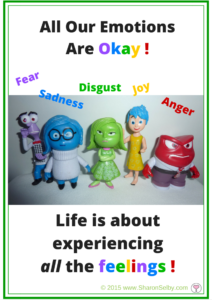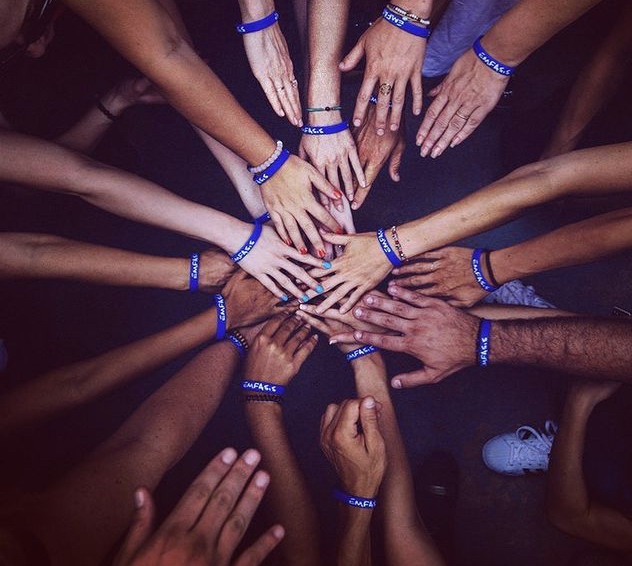Who Holds Responsibility for Our Own Feelings?

The title of this post might seem like an obvious question!
Who holds responsibility for our own feelings? Of course, we’re responsible for our own feelings.
But…
How often do we get into the “blame-game”?
We get caught up in blaming others when we get triggered!
We don’t actually take responsibility for our own feelings.
This is something we need to bring into our awareness and role model for our kids.
The Power of Our Thoughts
We often don’t realize the power of our thoughts. In my children’s anxiety management groups, I teach children (and parents) that our thoughts create our feelings and our feelings create our actions.
Depending on how we see and think about things, will determine how we then feel. This is the reason why a crying baby on an airplane might upset and really bother one person and yet not bother another person at all.
We all have a different lens through how we see things, based on our wiring, life-experiences, and the messages we received from our parents growing up.
As soon as we feel triggered, we need to stop and notice our feelings. Is it anxiety, anger, frustration, resentment, hurt, or a different feeling?
Next, we need to STOP and take RESPONSIBILITY for our OWN feelings.
What can I do in this moment to calm myself down without using hurtful words toward others, without being sarcastic or shaming, without yelling or without giving the “silent treatment” (stonewalling) ?
Things I Can Do to Take Care of My Feelings
- I can take a break until I calm down
- I can splash water on my face
- I can take deep breaths in my bedroom
- I can go for a walk or run
- I can drink water
- I can have a cold shower etc.
These are ways that we can take responsibility for our own feelings.
If I’m anxious about being late, I can let my kids/partner know ahead of time, that to feel calm, I need to leave 10 minutes early to build in buffer time, and if they’re not ready then you won’t be mad but you’ll need to take two separate cars.
If you’re irritated that the house is messy, you can express your feelings calmly and take action to take responsibility for your part.
We don’t need to say in “victim-mode”, we can take action by stepping into what we CAN do about something – this is what having responsibility for our own feelings looks like.
Are You Asking for What You Need?
If we don’t ask for what we need, then this is not being responsible. We need to let our kids, our partner, our boss etc. know what is bothering us so we can work together toward a solution.
This is how we grow ourselves. This is how we role model for our children so they too can grow.
“All our emotions are okay. All our behaviours are not okay” ~ Sharon Selby

The Feedback Wheel – A Four Step Process for Asking for What We Need (credit: Terrence Real – The New Rules of Marriage)
This is an example of the Feedback Wheel with a partner:
- Ask your partner if they are willing to listen
- Remember that your motivation is that you love them
- Take the four steps of the Feedback Wheel
i) Tell them what you saw/heard about a particular event
Eg. “When you came home late for dinner…”
ii) Tell them the story you have made up about it
Eg. “I told myself that you don’t really care enough to call or text and let me know that you’re going to be late”
iii) How you feel about it
Eg. “I feel disappointed that it looks like you don’t care”
iv) What you would like to have happen in the future
Eg. “In the future, I’d appreciate it, if you could be home for dinner at the time you originally told me, or call or text to let me know that you’re running late.”
- Let go of the outcome
We can adapt this process for asking our children for what we need and for teaching them to ask for what they need.
Whenever we are triggered, this is an opportunity for US TO GROW and do something differently and better.
This is a mantra that can help us in the heat of the moment: “This is an opportunity for me to grow!” Just by saying this to yourself, might help you feel a little lighter in the situation.
For further reading on this topic you may wish to read:
Why Do I Get So Triggered by My Kids and 5 Steps to Handle Them.
Use This Antidote to Handle Your Kids’ BIG Emotions
Are You Aware of How Much Your Ego Mind Is Impacting Your Parenting?
I hope you find these tips helpful and that they bring you more calm,
Warmly,

PS. Registration is open for my Summer anxiety “Brain Science” groups, starting this Thursday. In this group, I teach the important lesson that our thoughts create our feelings, and we have the power to change our thoughts. For more information and to register, click here.
Want to Connect?
Subscribe now to receive free weekly parenting tips and inspiration.






